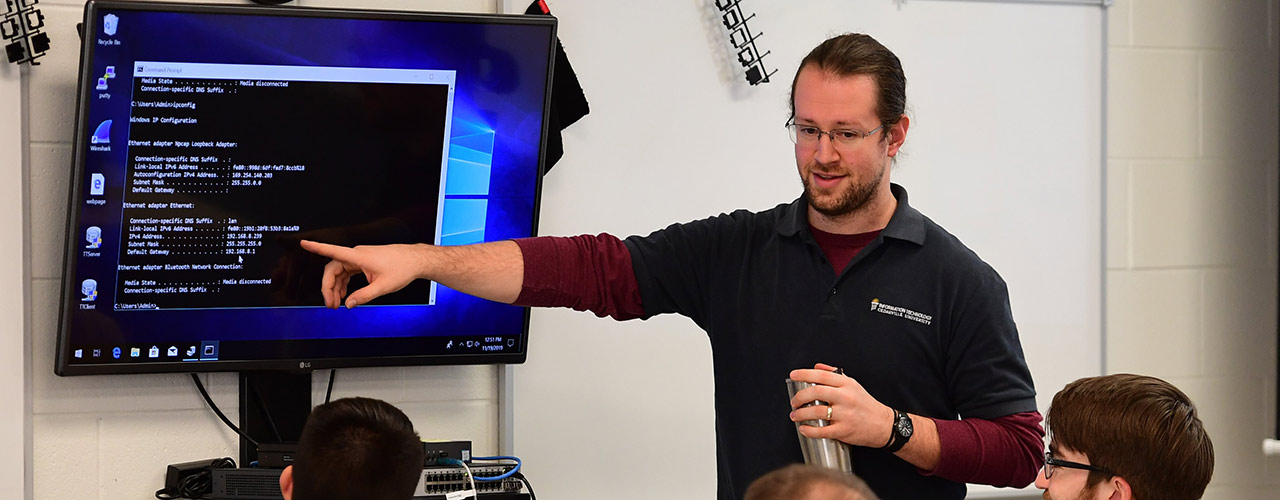by Brendan Rowland, Student Public Relations Writer
 Cedarville University is in the process of implementing an ambitious Wi-Fi upgrade project that will bring new, or improved, Wi-Fi access points to much of campus. The $1.6 million initiative began in December.
Cedarville University is in the process of implementing an ambitious Wi-Fi upgrade project that will bring new, or improved, Wi-Fi access points to much of campus. The $1.6 million initiative began in December.
Cedarville is collaborating on the project with technology partner, Aruba, a Hewlett Packard Enterprise company.
After the upgrade, there will be four times as many access points, which are devices that broadcast Wi-Fi signals to designated areas and allow devices to connect to the internet, around campus, and these access points will be repositioned and oriented to best suit the needs of modern technology.
This will increase network reliability and reduce latency, providing the seamless and secure transfer of data across the network for an improved user experience. Practically, that means a more consistent connection.
When Cedarville designed its Wi-Fi infrastructure in 2006, it was intended for occasional convenience, not to be relied on for instruction. In both residence halls and classrooms, the Wi-Fi access points are positioned with that goal in mind. While functional now, the university hopes to bring its Wi-Fi to state-of-the-art standards.
“Our expectations for technology have changed a lot in the last 15 years,” said Micah J. Cooper, associate vice president for technology and chief information officer. “Then, college students weren’t taking exams on Canvas or using Zoom.”
Because of this, the Wi-Fi access points are not situated where they are most needed now.
Cooper explains Wi-Fi by comparing it to talking in a crowded room. “In a big room where lots of people are talking, it’s difficult to be heard as the volume rises. Similarly, when many devices are trying to connect to a single access point, the volume makes it difficult to be heard, leading to poor Wi-Fi connections.
“We have more students than ever, each student has more devices than ever before and each device has higher Wi-Fi expectations. This leads to poor real-time communication over Wi-Fi,” Cooper continued.
The solution is an upgrade project that will cost approximately $1.6 million. Over Christmas break 2020, the five largest residence halls were upgraded. This Christmas break, the remaining residence halls, and academic buildings began to undergo renovation as well. The upgrade project is projected for completion by summer.
With the upgrade, there will be a minimum of one access point in each classroom and dorm room. “The places where students do most of their computing will each be equipped with their own Wi-Fi access point, dedicated to exclusively serving that area,” said network analyst Nat Biggs, who is primarily responsible for wireless networking.
One of the biggest spaces to be upgraded is the Jeremiah Chapel in the Dixon Ministry Center, home to Cedarville’s chapel service every Monday through Friday. “We’re designing the chapel to be able to handle 6,000 devices at once,” Biggs continued. “That involves placing access points in really interesting positions, such as under the seats or on the front wall of the balcony. This way, every seat will have good Wi-Fi coverage.”
The team also brought in Aruba consultants to the DeVries Theatre, Callan Gymnasium, Doden Field House, and the dining hall in the Stevens Student Center for consultation on optimal placement and configuration of the Wi-Fi access points to ensure an exceptional user experience.
“We at Aruba are impressed with both Cedarville’s commitment to providing their students with secure, high-performance wireless connectivity and the university’s engagement with us to ensure that its Wi-Fi deployment best fulfills that goal,” said Jason Clancy, territory manager for Aruba, who was involved in the project.
Cooper concluded by emphasizing the importance of this upgrade for students and the global network they connect to. “This $1.6 million is an investment in student success, recreation, and happiness,” he said. “More than that, our network is how we spread the gospel around the world.”
“Through Wi-Fi, we can go from the midst of Ohio cornfields and touch the globe.”
Located in southwest Ohio, Cedarville University is an accredited, Christ-centered, Baptist institution with an enrollment of 4,715 undergraduate, graduate, and online students in more than 150 areas of study. Founded in 1887, Cedarville is one of the largest private universities in Ohio, recognized nationally for its authentic Christian community, rigorous academic programs, strong graduation and retention rates, accredited professional and health science offerings, and high student engagement ranking. For more information about the University, visit cedarville.edu.


















